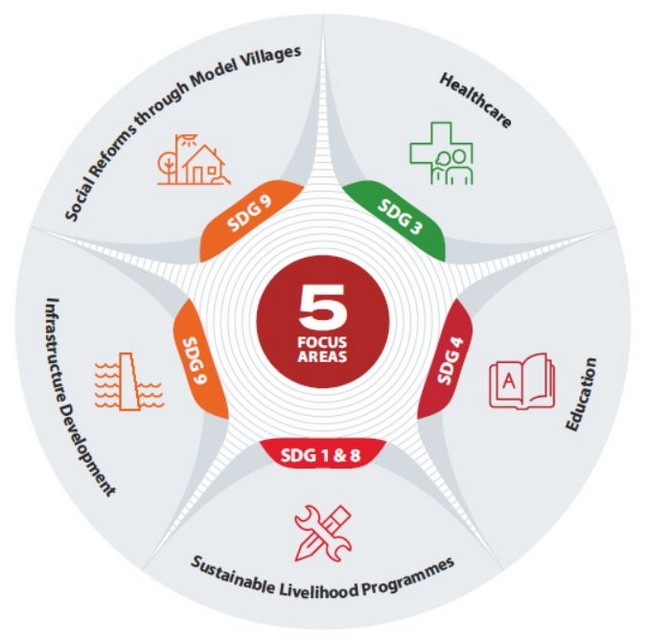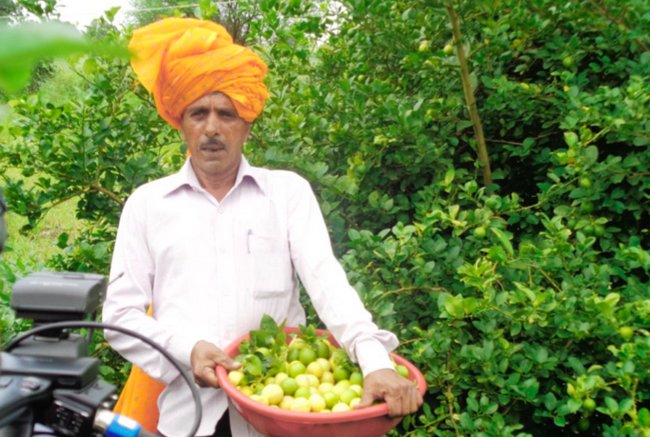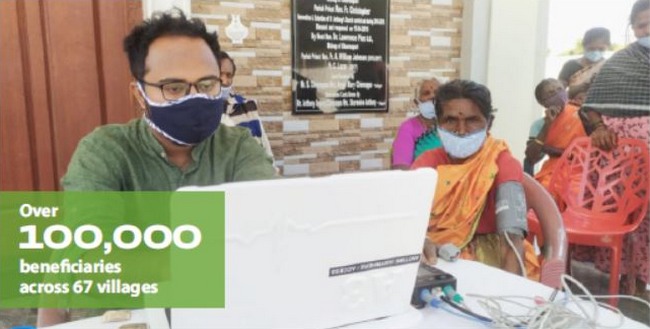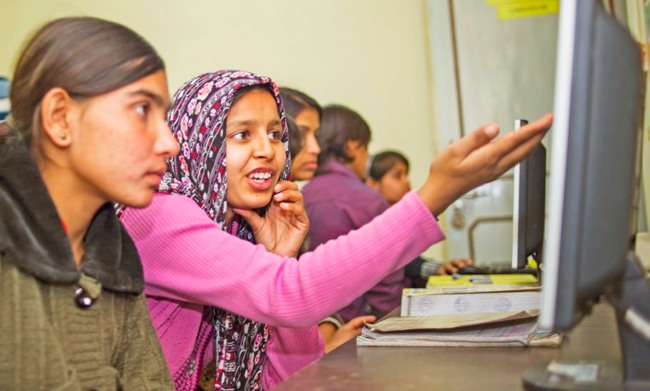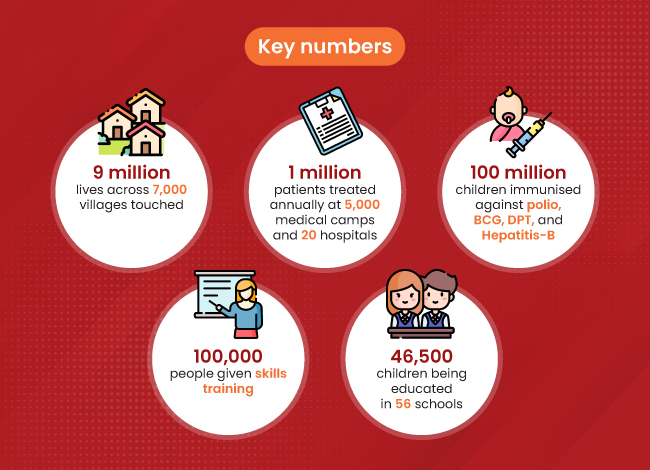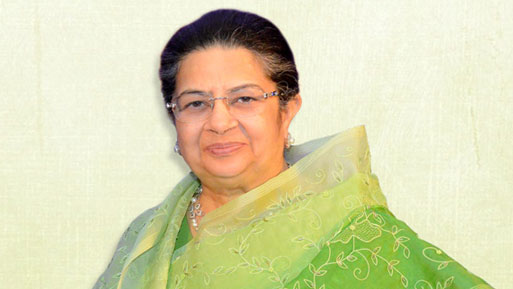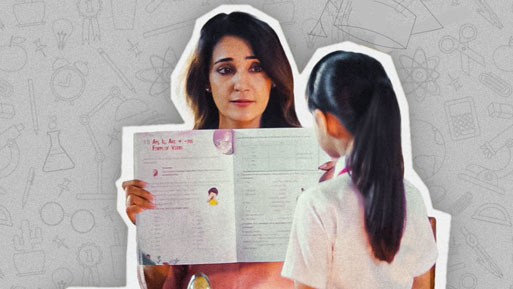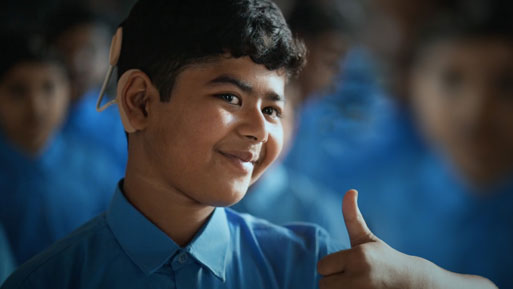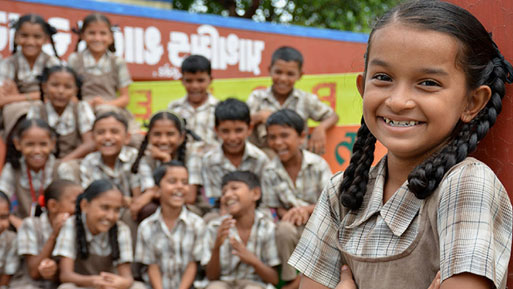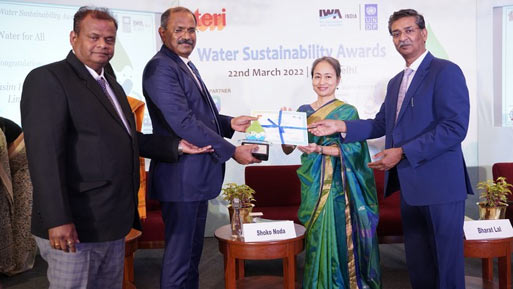Lighting up lives
24 June, 2022
ShareThe Aditya Birla Group's ethos of giving and caring underpins its community empowerment projects around healthcare, education, infrastructure, and other national priorities
As a responsible corporate, the Aditya Birla Group is committed to giving back to the communities in which it operates. The Group has invested considerable resources to transform the underserved sections of the society. As on date, its community initiatives engage with ~9 million people in 7,000 villages in India and around the world.
While the Group's community empowerment projects are driven by the Aditya Birla Centre for Community Initiatives and Rural Development, individual businesses also undertake long-term projects based on their geography and the unique needs of their stakeholder groups. Here's an overview of how the Group is helping communities improve and transform.
Sustainable livelihoods
The Group's sustainable livelihood projects empower communities to become self-reliant and maximise earning ability through vocational training. To date, the Group has imparted sustainable livelihood training to over 100,000 people. Of this, 95,000 beneficiaries have received training from Vocational Training Centres and the Aditya Birla Rural Technology Park. Around 45,000 of the beneficiaries are women who are also part of self-help groups set up with the Group's assistance.
Two noteworthy initiatives here are Project Swavalamb and Project Saksham, which are run by Aditya Aluminium, a division of Hindalco, in Odisha's Sambalpur district. Under Project Swavalamb, the company trains rural youth in vocational skills like nursing, tailoring, driving, ophthalmology, computer literacy, etc. Project Saksham has helped increase the incomes of 1,000+ women in 23 villages through structured entrepreneurship and economic empowerment programmes.
Women's empowerment is a major focus area for the projects. In 2019, Aditya Birla Capital launched a programme in Dindori and Mandla districts in Madhya Pradesh to ensure food and income security for underprivileged women farmers. Nearly 16,000 women were covered through intensive farm-based livelihood interventions. As a result, they were able to grow their average annual income from around Rs.31,000 a year to nearly Rs.78,000.
Besides skilling programmes, the Group also provides livelihood assistance in other forms. In partnership with other stakeholders, it enables livestock improvement services in over 100 villages under its 'Integrated Livestock Development Centres'. This initiative has resulted in increased milk production, and consequently, increased earnings for the farmers.
Healthcare
Extending healthcare to every citizen is one of India's biggest developmental imperatives. The Aditya Birla Group supports this crucial mission through its 20 hospitals and 5,000 medical camps that it organises regularly. The camps cater to around 1 million patients annually.
Maternal and community health are focus areas for the health interventions and the Group undertakes several projects focused on mother and childcare, immunisation (especially for polio), healthcare for the visually impaired and differently-abled, and HIV prevention.
Hindalco, the Group's metals flagship, has partnered the government to launch immunisation initiatives at its 23 plant sites in India. This has resulted in 150,000 children being immunised every year for polio, BCG, DPT and Hepatitis-B. In all, over 100 million children have been immunised since the programme began.
Meanwhile, health camps facilitated by Aditya Birla Fashion & Retail Ltd. (ABFRL) have screened over 100,000 people in 67 villages for cancer, cataract, dental health, and other health issues. In rural Tamil Nadu, ABFRL recently launched 'e-Healthcare', an IT-enabled Smart Diagnostic System that delivers digital healthcare solutions, including tests for 30+ health parameters.
Education
Education is another focus area and, the Group strengthens and augments education infrastructure in villages to facilitate superior learning experiences. The focus is on pre-school education, educational support, vocational and technical education training, and upgrading of school infrastructure. About 46,500 children are currently being educated at 56 schools run or supported by the Group.
An interesting initiative here is KHEL, a knowledge hub for e-learning which caters to students in Maharashtra, Madhya Pradesh and Uttar Pradesh. Through KHEL, the students learn English, math and science using gaming pedagogy and multimedia methods. Another project, Gyanarjan, coaches underprivileged students for competitive examinations. The Group also champions girl child education through residential schools, girl child advocacy, and support.
The Group's cement flagship, UltraTech, runs a number of initiatives to support the education of underprivileged students. It offers free coaching to students enrolled at Navodaya Vidyalayas (government-run schools for gifted students from rural areas). The Kagina Private Industrial Training Institute in Gulbarga, Karnataka, offers employment to local youth in 21 'adopted' villages by providing them technical skills.
Gyandhara, another UltraTech initiative, promotes digital literacy, specialised coaching, skill development, Kisan Pathsala (farmer schools) for agri-business, and village libraries.
Infrastructure development
Making communities self-sufficient in terms of clean drinking water, sanitation, proper roads, and other infrastructure is another area of intervention. The Group has helped build community halls, school blocks and playgrounds, approach roads, installed solar lights, water harvesting structures, hand pumps and village drainage systems. Altogether, these initiatives have benefited around 500,000 people.
To reduce the reliance on fossil fuels, the Group has set up over 1,000 bio-gas plants pan-India. It has also collaborated with Habitat for Humanity to build 500 houses in rural regions and is supporting the building of an additional 3,800 houses.
Water scarcity is a serious challenge in many parts of rural India. To address this issue, UltraTech has executed watershed activities in multiple states. Together, these projects enable 4,500 families – mainly small farmers – to becomoe water-secure, while simultaneously rejuvenating local biodiversity.
Social reforms through model villages
To transform India, one must start with its villages. And the adage anchors the Aditya Birla Group's 'model villages' initiative which has succeeded in making 300 villages self-reliant in all aspects – education, healthcare, family welfare, infrastructure, agriculture, watershed management, and sustainable livelihoods.
To give shape to the vision, Group companies like UltraTech, Grasim, Hindalco and ABFRL, etc., have created model villages around their facilities over the last decade. Not only have education, health and livelihoods seen significant improvement, it has also helped counter social issues such as female foeticide, child marriages, dowry, ill-treatment of women, alcoholism, etc.
Digital transformation is another facet of the initiative. For instance, ABFRL has established Village Information Centres in four model villages and a Computer Centre in one village. These Centres, equipped with computers and WiFi internet, have helped over 23,000 community members hone their digital skills.
The end goal of the model villages initiative is to hand over the reins back to the communities once the villages achieve a degree of developmental momentum, and that has already happened in many places. Of the original 300 villages, the Group continues to engage with 128 villages in 22 states today.
Big on communities
By using its reach, resources, and voice, the Group addresses the pain-points of rural communities and engages, uplifts, and empowers them to achieve their full potential. The range and depth of its activities, and the nine million lives it has touched, speaks volumes about the Group's commitment to give back to the community in which it operates.
To read the full report, click here



